b-17g
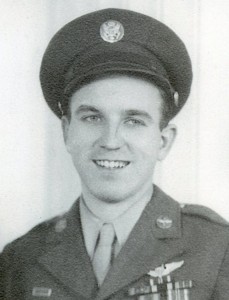
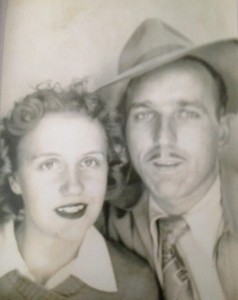 I have been studying a lot lately about World War II. It is my “favorite” war…if one can have a favorite war. My dad, Allen Spencer was a Staff Sergeant in World War II. He served as flight engineer and top turret gunner on a B-17G, the flying fortress. The more I study World War II, the more I realize just how dangerous was…no matter what branch of the service a soldier was in. Dad’s family was one that didn’t have to suffer the loss of their soldier, because my dad came home after the war. He was the only one in his family that saw action in World War II, other than his half-brother, Norman Spencer. Dad’s older brother, Bill tried to serve, but due to flat feet and a hernia, he was turned down. My Uncle Bill was devastated by the rejection. My dad was his little brother, and he had always felt a need to protect him, not because Dad was accident prone or anything, but because he was his little brother. Now, he was going to have to let Dad go without the “backup” that Uncle Bill had hoped to provide. That was one of the hardest things my Uncle Bill ever had to do. So, Dad went with angel backup instead…and his mother’s prayers.
I have been studying a lot lately about World War II. It is my “favorite” war…if one can have a favorite war. My dad, Allen Spencer was a Staff Sergeant in World War II. He served as flight engineer and top turret gunner on a B-17G, the flying fortress. The more I study World War II, the more I realize just how dangerous was…no matter what branch of the service a soldier was in. Dad’s family was one that didn’t have to suffer the loss of their soldier, because my dad came home after the war. He was the only one in his family that saw action in World War II, other than his half-brother, Norman Spencer. Dad’s older brother, Bill tried to serve, but due to flat feet and a hernia, he was turned down. My Uncle Bill was devastated by the rejection. My dad was his little brother, and he had always felt a need to protect him, not because Dad was accident prone or anything, but because he was his little brother. Now, he was going to have to let Dad go without the “backup” that Uncle Bill had hoped to provide. That was one of the hardest things my Uncle Bill ever had to do. So, Dad went with angel backup instead…and his mother’s prayers.
Dad served and returned home to his family, and because he did, my sisters and I, and our whole family exists. 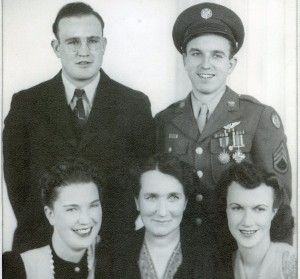
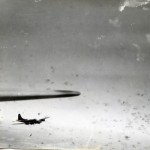 Dad, like many of the soldiers in that generation, never spoke of his time in the service during World War II, and all we knew was what little we heard from his family, and a couple of newspaper articles. Knowing my dad as we did, those years were his duty, but never his desire. Dad was a gentle man, and the idea of killing must have weighed heavily on him. Nevertheless, he knew it was his duty, and he would never have shirked his duty. There were a number of heroic times in Dad’s time in the service. He actually saved his crew, when he cranked down the landing gear just in time to hit the runway. It must have been damaged by the anti-aircraft flak, because it wouldn’t come down. There were other times that his actions saved his crew, such as the enemy planes that he shot down. They were a good team. They were all heroes…every single one.
Dad, like many of the soldiers in that generation, never spoke of his time in the service during World War II, and all we knew was what little we heard from his family, and a couple of newspaper articles. Knowing my dad as we did, those years were his duty, but never his desire. Dad was a gentle man, and the idea of killing must have weighed heavily on him. Nevertheless, he knew it was his duty, and he would never have shirked his duty. There were a number of heroic times in Dad’s time in the service. He actually saved his crew, when he cranked down the landing gear just in time to hit the runway. It must have been damaged by the anti-aircraft flak, because it wouldn’t come down. There were other times that his actions saved his crew, such as the enemy planes that he shot down. They were a good team. They were all heroes…every single one.
While my dad was a hero during World War II, I will always consider his most important accomplishment, his family. Without my dad’s safe return from the war, we would not exist. He met my mom, Collene Byer Spencer when she was still a schoolgirl, but even then, they knew it was that forever love. They married in 1953, an 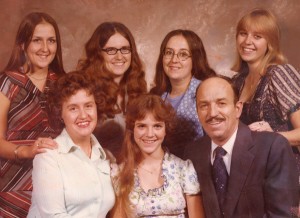
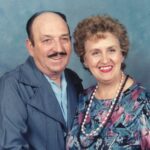 became the parents of five daughters, Cheryl, Masterson, Caryn Schulenberg (me), Caryl Reed, Alena Stevens, and Allyn Hadlock. They went on to have grandchildren and great grandchildren…all of whom owe their lives to the fact that dad came home from war. For that I praise God, and I give Him all the glory. Today would have been my dad’s 99th birthday. Happy birthday in Heaven, Dad. We love and miss you very much and look forward to seeing you again when we get to Heaven.
became the parents of five daughters, Cheryl, Masterson, Caryn Schulenberg (me), Caryl Reed, Alena Stevens, and Allyn Hadlock. They went on to have grandchildren and great grandchildren…all of whom owe their lives to the fact that dad came home from war. For that I praise God, and I give Him all the glory. Today would have been my dad’s 99th birthday. Happy birthday in Heaven, Dad. We love and miss you very much and look forward to seeing you again when we get to Heaven.
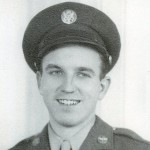 When the United States entered World War II, after the attack on Pearl Harbor, we were a nation with a score to settle. The Japanese had killed our people, and we vowed to make them pay. In addition to that, the Nazis were killing the Jewish people, and they had to be stopped. Their cruel killing of so many people in their gas chambers could not be tolerated. Revenge against the Japanese would have to wait for now, because the Nazi cruelty could no longer be kept hidden.
When the United States entered World War II, after the attack on Pearl Harbor, we were a nation with a score to settle. The Japanese had killed our people, and we vowed to make them pay. In addition to that, the Nazis were killing the Jewish people, and they had to be stopped. Their cruel killing of so many people in their gas chambers could not be tolerated. Revenge against the Japanese would have to wait for now, because the Nazi cruelty could no longer be kept hidden.
On of the biggest battles fought on German soil was the Battle of Berlin. It was fought over the course of a couple of years, and Britain’s Royal Air Force had been badly beaten by the Germans. Then when the United States joined in, things began to take a 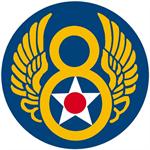 turn for the better. On May 7, 1944, the United States 8th Air Force sent 1500 bombers in to attack Berlin. More were sent the next day. The headlines were exuberant. Headlines like Berlin “Condemned to Death”, U.S. Planes Blast Berlin Twice, Capital Lies In Stark Ruins, and Berlin Again Plastered By Yank Fliers, were splattered across the papers. It was the ultimate attack on the heart of Nazi Germany from the Mighty 8th Air Force. I think everyone knew that Hitler’s days in power were numbered. It was true. The Nazis surrendered unconditionally a year later.
turn for the better. On May 7, 1944, the United States 8th Air Force sent 1500 bombers in to attack Berlin. More were sent the next day. The headlines were exuberant. Headlines like Berlin “Condemned to Death”, U.S. Planes Blast Berlin Twice, Capital Lies In Stark Ruins, and Berlin Again Plastered By Yank Fliers, were splattered across the papers. It was the ultimate attack on the heart of Nazi Germany from the Mighty 8th Air Force. I think everyone knew that Hitler’s days in power were numbered. It was true. The Nazis surrendered unconditionally a year later.
My dad was a Top Turret Gunner and Flight Engineer on a B-17G Bomber at this time, and while I don’t know if Dad took part in this attack, I can say that it is entirely possible. My dad didn’t talk about his war days much…most men from that era didn’t. I 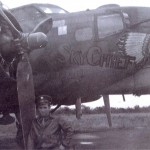 have to think that it was hard to remember those missions, because no matter how distanced you were from your target, you were still very aware that people were dying because of the bombs you were dropping. Sure, they were the enemy, and you were doing your job, but the were also humans. I think, if it were me, I would rather have to kill in the way my dad did…not looking into the eyes of the person you are about to kill, and in some attacks, the people didn’t have any idea that they were about to die. They, like my dad, were just doing their jobs. Still, they were soldiers under a cruel dictator, with no choice but to obey orders. Nevertheless, sad as it was for those people to die, I am very proud of my dad’s service. And if he was in this battle, then I am proud of that too.
have to think that it was hard to remember those missions, because no matter how distanced you were from your target, you were still very aware that people were dying because of the bombs you were dropping. Sure, they were the enemy, and you were doing your job, but the were also humans. I think, if it were me, I would rather have to kill in the way my dad did…not looking into the eyes of the person you are about to kill, and in some attacks, the people didn’t have any idea that they were about to die. They, like my dad, were just doing their jobs. Still, they were soldiers under a cruel dictator, with no choice but to obey orders. Nevertheless, sad as it was for those people to die, I am very proud of my dad’s service. And if he was in this battle, then I am proud of that too.
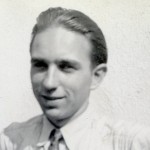 In 1938 to 1939, my dad moved from the family farm, into town so he could attend vocational school. He studied sheet metal fabrication. After he graduated, he moved to Santa Monica, California, at the very young age of just 17 years, and went to work for Douglas Aircraft. Uncle Bill, dad’s brother, let him take his 1934 Plymouth, which broke down on the way there, and Dad had to wire his dad for the money to fix it. It’s pretty had to fix a broken down car, when you are on the way to a new job. Most of us don’t have a lot of money at that point, and after the Great Depression, the country was just starting to come back. This job would begin to move my dad into a position for some of his future jobs, later in life, beginning with his military placement as a Flight Engineer. The Flight Engineer had to know everything about the plane, because it was his job to try to get them back to the base safely…even if something went wrong with the plane. There was no place to pull over when you are flying at 25,000 to 30,000 feet. There was at least one time I know of that Dad was the only reason they came back safely, because the landing gear would not go down. He had to hang upside down in the open bomb bay and crank it down by hand.
In 1938 to 1939, my dad moved from the family farm, into town so he could attend vocational school. He studied sheet metal fabrication. After he graduated, he moved to Santa Monica, California, at the very young age of just 17 years, and went to work for Douglas Aircraft. Uncle Bill, dad’s brother, let him take his 1934 Plymouth, which broke down on the way there, and Dad had to wire his dad for the money to fix it. It’s pretty had to fix a broken down car, when you are on the way to a new job. Most of us don’t have a lot of money at that point, and after the Great Depression, the country was just starting to come back. This job would begin to move my dad into a position for some of his future jobs, later in life, beginning with his military placement as a Flight Engineer. The Flight Engineer had to know everything about the plane, because it was his job to try to get them back to the base safely…even if something went wrong with the plane. There was no place to pull over when you are flying at 25,000 to 30,000 feet. There was at least one time I know of that Dad was the only reason they came back safely, because the landing gear would not go down. He had to hang upside down in the open bomb bay and crank it down by hand.
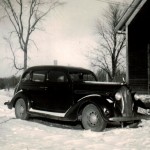
My dad was very good at the work he did for Douglas Aircraft, but on December 7, 1941, everything changed. Dad left California, in the 1936 Plymouth he had bought, and came home just as the United States was entering World War II. His plan, of course, was to join the Army Air Forces. He was a perfect match for the Army Air Forces, because of his knowledge of air craft, and they saw that right away. He was put into training, and placed on a B-17G crew, as the Flight Engineer, and stationed at Great Ashfield, Suffolk, England. His crew left Texas, and flew to New York City, on April 1, 1944, where they refueled and went on to England.
Most crews on B-17G planes had to fly 35 missions before they could come home, but at Great Ashfield, because of how dangerous that area was, they only had to fly 25. My dad ended up flying 26 before he came home. I don’t think his family knew how dangerous that base was, because my dad would not have told them. “The average life of a B-17 bomber at Great Ashfield was just over 4 months. Very few B-17 bombers that were transferred to the base lasted a complete tour of duty. The average Airman lasted 15 combat missions and few completed an entire tour of 25 missions. Much less 35 !!!! The average LIFE of a Ball Turret Gunner in combat was 12 MINUTES.” Knowing that my dad somehow beat those odds, reminds me of 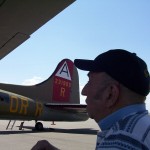 the many miracles in his life. His crew did lose at least one Ball Turret Gunner, and my dad tried everything he could to save his life, but it was no use…he was gone.
the many miracles in his life. His crew did lose at least one Ball Turret Gunner, and my dad tried everything he could to save his life, but it was no use…he was gone.
In later years, Dad would work for Fred Dewell, as a welder and sheet metal fabricator. His training at vocational school and Douglas Aircraft made him an asset to that company. Then Dad went to work for WATCO, building the boxes for Caterpillar trucks. He was one of their best welders, and was remembered by the people who worked there for many years after his retirement. His training as a young man of only 16 years, served him well all of his life, and I have always been very proud of the things he did in his lifetime.

